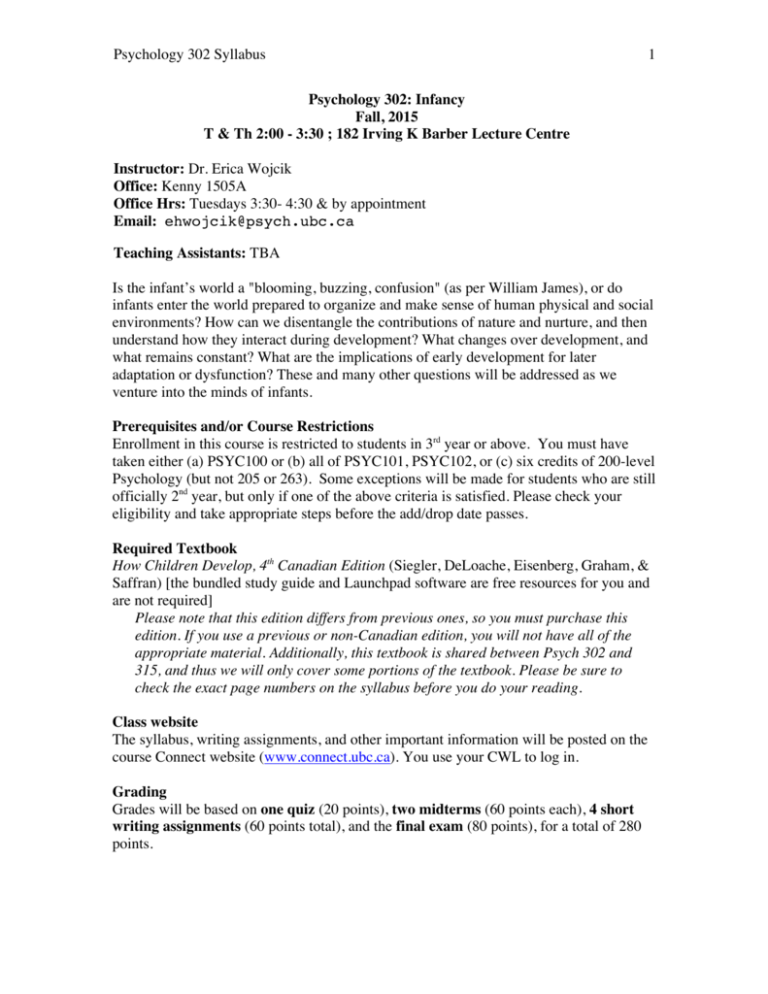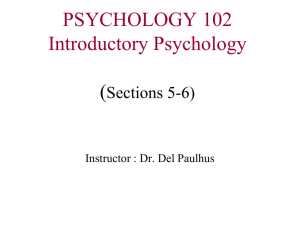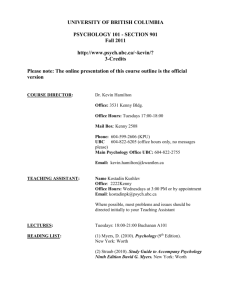Psychology 302 Syllabus 1 Psychology 302: Infancy Fall, 2015 T
advertisement

Psychology 302 Syllabus 1 Psychology 302: Infancy Fall, 2015 T & Th 2:00 - 3:30 ; 182 Irving K Barber Lecture Centre Instructor: Dr. Erica Wojcik Office: Kenny 1505A Office Hrs: Tuesdays 3:30- 4:30 & by appointment Email: ehwojcik@psych.ubc.ca Teaching Assistants: TBA Is the infant’s world a "blooming, buzzing, confusion" (as per William James), or do infants enter the world prepared to organize and make sense of human physical and social environments? How can we disentangle the contributions of nature and nurture, and then understand how they interact during development? What changes over development, and what remains constant? What are the implications of early development for later adaptation or dysfunction? These and many other questions will be addressed as we venture into the minds of infants. Prerequisites and/or Course Restrictions Enrollment in this course is restricted to students in 3rd year or above. You must have taken either (a) PSYC100 or (b) all of PSYC101, PSYC102, or (c) six credits of 200-level Psychology (but not 205 or 263). Some exceptions will be made for students who are still officially 2nd year, but only if one of the above criteria is satisfied. Please check your eligibility and take appropriate steps before the add/drop date passes. Required Textbook How Children Develop, 4th Canadian Edition (Siegler, DeLoache, Eisenberg, Graham, & Saffran) [the bundled study guide and Launchpad software are free resources for you and are not required] Please note that this edition differs from previous ones, so you must purchase this edition. If you use a previous or non-Canadian edition, you will not have all of the appropriate material. Additionally, this textbook is shared between Psych 302 and 315, and thus we will only cover some portions of the textbook. Please be sure to check the exact page numbers on the syllabus before you do your reading. Class website The syllabus, writing assignments, and other important information will be posted on the course Connect website (www.connect.ubc.ca). You use your CWL to log in. Grading Grades will be based on one quiz (20 points), two midterms (60 points each), 4 short writing assignments (60 points total), and the final exam (80 points), for a total of 280 points. Psychology 302 Syllabus 2 Exams: The quiz, midterms, and final exam will be all multiple choice. They will include information from lecture and the textbook, with a focus on information from lecture. If something is mentioned both in lecture and the book, you can be sure that it will be on the test. The midterms and final will be cumulative, but with more questions on the material since the last exam. The exams will require you to integrate information across topics in class and apply knowledge to new situations; memorization will only get you so far, so be sure that you understand each study and theory at a deep level. Class Attendance: While I will not be formally taking attendance, lectures will cover material above and beyond what you will read in the textbook. You will not be able to do well on exams without coming to class. Additionally, I will not be posting lecture slides online. If you miss a class, please contact a classmate to find a way to go over their notes. Written assignments: Due dates for the four written assignments (each less than 1000 words) are in the syllabus. Assignment sheets with detailed information will be posted on Connect at least one month before the assignment is due. Some assignments may be completed in groups; please see assignment sheets for details on group work. Please see sections on late work and missed exams below. Final Grades: In order to reduce grade inflation and maintain equality across multiple course sections, all psychology courses are required to comply with departmental norms regarding grade distributions. According to these norms, the average grade in a 100- and 200-level Psychology course must be between 63 and 67, with a standard deviation of 14. For 300- and 400- level classes, like this one, the average must be between 66 and 70, with a standard deviation of 13. Scaling must be used in order to comply with these norms, and thus grades will be scaled up or down as necessary by the professor or department. Each student will earn a percent grade for this course and will be automatically be assigned a grade by the Registrar. Extra Credit An additional 3% (added to your final grade) can be obtained by participating in studies using the Human Subject Pool. Participating in studies provides a valuable opportunity to experience ‘research in action’. To sign up and get started, see https://hsp.psych.ubc.ca. Please register in the system by the end of the first month of classes to have the opportunity to earn your first ½ hour credit with a brief online survey that will increase your eligibility for more studies. You earn 1 percent point for each hour of participation. Partial hours are rounded down (1.5 = 1 % point). For more information, and to view the alternative library assignment, go to https://hsp.psych.ubc.ca. Psychology 302 Syllabus 3 Topics and Readings Note: For topics that span multiple days, lectures will cover the assigned readings over the course of those days, not necessarily in the order that the readings are listed. While assignment due dates will not be moved up, I reserve the right to make other changes to this syllabus as necessary throughout the semester. ______________________________________________________________________________ September 10: Overview of the semester, class logistics, etc. ______________________________________________________________________________ September 15: What is development? Chapter 1 (to page 22) ______________________________________________________________________________ September 17: Research methods for developmental psychology Chapter 1 (23- 37) ______________________________________________________________________________ September 22, 24, 29: Biological foundations Chapter 2 (40-81) Chapter 3 (85-122) Chapter 5 (189-197) ______________________________________________________________________________ October 1: Quiz _____________________________________________________________________________ October 6, 8, 13: Infant sensation, perception, learning Chapter 5 (172-188) Chapter 5 (198-205) Chapter 6 (224-230) Chapter 7 (260-265) ______________________________________________________________________________ October 15: Midterm Exam 1 ______________________________________________________________________________ October 20, 22, 27 Cognitive development Chapter 4 (130-167) Chapter 5 (205-211) Chapter 7 (276-296) Popular Science Article Analysis due on October 27 ______________________________________________________________________________ October 29; November 3, 5: Language development Chapter 6 (216-257) ______________________________________________________________________________ November 10, 12: Emotional development Chapter 10 (383-410) Chapter 11 (424-439) Language Assignment due on November 10 ______________________________________________________________________________ November 17: Midterm Exam 2 ______________________________________________________________________________ November 19, 24: Social development and social cognition Chapter 7 (266-275) Chapter 9 (342-381) Chapter 11 (439-441) Your Popular Science Article due on November 24 ______________________________________________________________________________ November 26: Moral development Chapter 14 (553-571) Psychology 302 Syllabus 4 ______________________________________________________________________________ December 1, 3: Atypical development & concluding issues Chapter 16 (638-665) Toy/Game Assignment due on December 3 ______________________________________________________________________________ Contacting us: I look forward to meeting each of you over the course of the semester and to helping you with questions about course-related material. Please visit our office hours, even if you don’t have a specific question. To help me respond to student questions as quickly and thoroughly as possible, please adhere to the following email policy: All email queries regarding the course must first be directed to the TA. Only after corresponding with the TA may questions be emailed to the instructor (except in cases where the question concerns the TA directly or as specifically indicated by the instructor). Students must include the TA’s response within the body of their email to the instructor, or the email may be returned unanswered. Please write Psych 302 in the subject line so that the TAs can respond more promptly. Conflicts and special testing conditions Please note that the University accommodates students with physical or mental disabilities The University also accommodates students whose religious obligations conflict with attendance, submitting assignments, or completing scheduled tests and examinations. Please let your instructor know by Tuesday, September 15th if you will require any special requirements. Students who plan to be absent for varsity athletics, family obligations, or other similar commitments cannot assume they will be accommodated, and should discuss their commitments with Dr. Wojcik before the drop date. Late-work policy The due dates for all written assignments are listed in this syllabus as well as on top of each assignment sheet (to be posted on Connect). If you do not submit the assignment by 5pm on the due date, two points will be deduced for each day (24-hours) late. Assignments that are turned in more than 5 days late will receive a zero. If unusual circumstances arise and you cannot make a due date, please let me know before the due date, if possible, to avoid deductions. Make-up exams The only acceptable reasons for missing an exam are illness or family emergencies; a written note from your doctor or your family’s doctor will be necessary. You, or someone you designate, must contact Dr. Wojcik or a TA in writing before the exam. This applies to the quiz, both midterms and to the final. Without such timely documentation, a makeup exam will not be given, and, you will receive a 0 for that exam. All make-up exams will be essay exams. Psychology 302 Syllabus 5 Final Exam: Due to the size of the class, requests for alternative test dates cannot be accommodated. To protect your privacy, grades will not be posted, given over the phone, or distributed by email. Office Hours: Please come, even if you don’t have a specific question – it’s always helpful to introduce yourself and have a chance to chat with professors and grad students. More news you can use: (1) The ideal strategy for readings in this class to come to lecture to gain an understanding of the framework for the topic, and then use that framework to guide your textbook reading after class. While reading, focus on the topics and studies that were covered in class, although all material in the assigned readings is fair game for exams. (2) If we make a mistake on an exam question and you correct the mistake (with documentation or a citation from the text or a scientific article), you will receive double credit for that test item. (3) Please use your best judgment when speaking in class. We want to encourage your questions and comments, but try to police yourself if you find that you are commenting very frequently; given the size of this class, we need to be sure that everyone who wants to speak gets a turn. Notice from the Department of Psychology Position on Academic Misconduct Acts of academic misconduct are taken very seriously. Such acts diminish the educational experience for all involved – students who commit the acts, classmates who would never consider engaging in such behaviors, and instructors. Academic misconduct includes, but is not limited to, cheating on assignments and exams, stealing exams, sabotaging the work of classmates, submitting fraudulent data, plagiarizing the work of classmates or published and/or online sources, acquiring previously written papers and submitting them (altered or unaltered) for course assignments, collaborating with classmates when such collaboration is not authorized, and assisting fellow students in acts of misconduct. Students who have knowledge that classmates have engaged in academic misconduct should report this to the instructor. The Department of Psychology has taken steps to alleviate misconduct. In the first place, the Department has implemented software that can reliably detect cheating on multiplechoice exams by analyzing the patterns of students’ responses. In addition, the Department subscribes to TurnItIn – a service designed to detect and deter plagiarism. All materials (term papers, lab reports, etc.) that students submit for grading will be scanned and compared to over 4.5 billion pages of content located on the Internet or in TurnItIn’s own proprietary databases. The results of these comparisons are compiled into customized “Originality Reports” containing several sensitive measures of plagiarism; instructors receive copies of these reports for every student in their class. In all cases of suspected academic misconduct, the parties involved will be pursued to the fullest extent dictated by the guidelines of the University. Strong evidence of cheating or Psychology 302 Syllabus 6 plagiarism may result in a zero credit for the work in question. According to the University Act (section 61), the President of UBC has the right to impose harsher penalties including (but not limited to) a failing grade for the course, suspension from the University, cancellation of scholarships, or a notation added to a student’s transcript. All graded work in this course, unless otherwise specified, is to be original work done independently by individuals, or if specified, in a group. If you have any questions as to whether or not what you are doing is even a borderline case of academic misconduct, please consult your instructor. For details on pertinent University policies and procedures, please see Chapter 5 in the UBC Calendar (http://students.ubc.ca/calendar) and read the University’s Policy 69 (http:/www.universitycounsel.ubc.ca/policies/policy69.html). Other Resources For learning: • UBC Academic Regulations: Information on academic regulations, including course withdrawal dates and credits, can be found in the UBC Calendar at http://students.ubc.ca/calendar • UBC Learning Commons: http://learningcommons.ubc.ca offers a variety of learning and research sources for students. The website includes tutoring, workshops, study groups, many other online tools, and links to most of the academic resources offered at UBC. • UBC Writing Centre: www.writingcentre.ubc.ca offers tutoring services, online workshops, and links to other useful writing centres. For coping with stress and hardship: • UBC Counseling Services: http://www.students.ubc.ca/livewelllearnwell/bookanappointment/counselling-services/ or 604-822-3811 • Vancouver Crisis Line: http://www.crisiscentre.bc.ca/about-us/contactus/ • Skills for Time Management: http://learningcommons.ubc.ca/timemanagement/






![July 31 Connect eupdate DRAFT [1]](http://s3.studylib.net/store/data/008100166_1-21bd0e395dcbfd67aaad5f18dd4ec08e-300x300.png)
